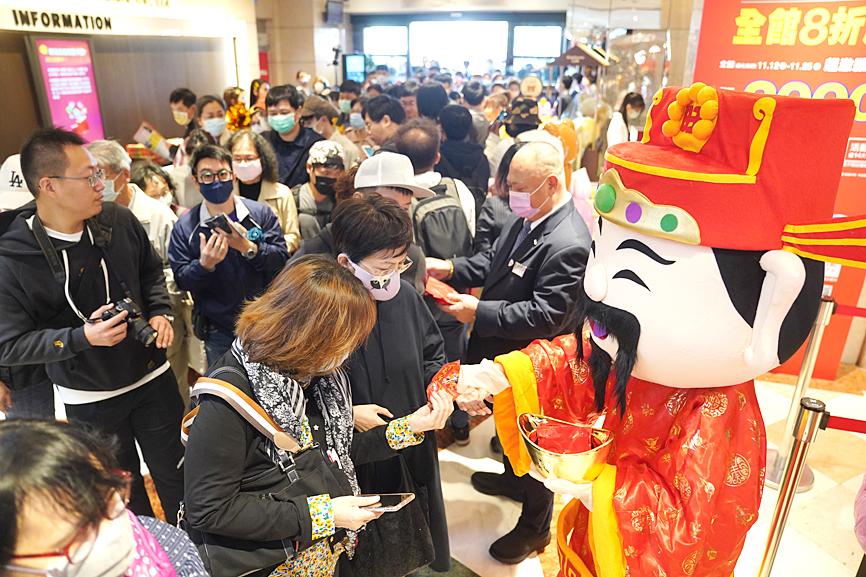Retail sector sales reached NT$351.8 billion (US$12.2 billion) last month, a 3.3 percent annual increase and the best October figure on record, the Ministry of Economic Affairs reported on Monday, citing healthy holiday spending and department store sales.
“Compared with last year, the number of national holidays in October was up this year,” Department of Statistics Deputy Director-General Huang Wei-jie (黃偉傑) said. “This, combined with aggressive sales driven by department stores and online retailers, gave us very strong October retail sales.”
Sales of general merchandise rose 6.2 percent year-on-year, department store sales shot up 15 percent, e-commerce and mail order sales were up 10 percent, and shoe and apparel sales surged 24 percent, ministry statistics showed.

Photo: CNA
E-commerce retailers brought their annual sale events — which traditionally start on Nov. 11 — forward into late last month, Huang said.
“The results have been impressive,” he added.
Vendors in the food and beverage sector also benefited from holidaymakers who took advantage of the holidays to shop and sightsee, the ministry said.
Last month, food and beverage sales reached NT$66.6 billion, up 3.1 percent year-on-year and also a record for October, it said.
“The main reason for the rise is people taking advantage of the holidays to get together for meals or travel,” Huang said. “The department stores’ anniversary sale events also contributed to getting people out in the streets.”
However, drink store sales were down 2.4 percent year-on-year due to the cooler weather and heavy competition resulting in store closures, while the banquet and catering trade was still affected by COVID-19 related border controls, with sales shrinking 30.3 percent year-on-year, the ministry said.
The wholesale sector saw sales fall 0.4 percent year-on-year to NT$892.7 billion last month, which Huang attributed to the continued effects of COVID-19 suppressing global demand.
Within the sector, sales of construction materials fell 6.1 percent and apparel sales fell 7.6 percent, ministry data showed.
It is “pretty certain” that the wholesale and retail sectors will end the year in the black, despite being hit by COVID-19 earlier this year, Huang said.
Although the food and beverage sector’s sales have also rebounded, the sector would probably suffer an overall loss this year, due to a lack of national holidays at the end of the year and the continued slump in the banquet and catering trade, he said.

Stephen Garrett, a 27-year-old graduate student, always thought he would study in China, but first the country’s restrictive COVID-19 policies made it nearly impossible and now he has other concerns. The cost is one deterrent, but Garrett is more worried about restrictions on academic freedom and the personal risk of being stranded in China. He is not alone. Only about 700 American students are studying at Chinese universities, down from a peak of nearly 25,000 a decade ago, while there are nearly 300,000 Chinese students at US schools. Some young Americans are discouraged from investing their time in China by what they see

MAJOR DROP: CEO Tim Cook, who is visiting Hanoi, pledged the firm was committed to Vietnam after its smartphone shipments declined 9.6% annually in the first quarter Apple Inc yesterday said it would increase spending on suppliers in Vietnam, a key production hub, as CEO Tim Cook arrived in the country for a two-day visit. The iPhone maker announced the news in a statement on its Web site, but gave no details of how much it would spend or where the money would go. Cook is expected to meet programmers, content creators and students during his visit, online newspaper VnExpress reported. The visit comes as US President Joe Biden’s administration seeks to ramp up Vietnam’s role in the global tech supply chain to reduce the US’ dependence on China. Images on

New apartments in Taiwan’s major cities are getting smaller, while old apartments are increasingly occupied by older people, many of whom live alone, government data showed. The phenomenon has to do with sharpening unaffordable property prices and an aging population, property brokers said. Apartments with one bedroom that are two years old or older have gained a noticeable presence in the nation’s six special municipalities as well as Hsinchu county and city in the past five years, Evertrust Rehouse Co (永慶房產集團) found, citing data from the government’s real-price transaction platform. In Taipei, apartments with one bedroom accounted for 19 percent of deals last

US CONSCULTANT: The US Department of Commerce’s Ursula Burns is a rarely seen US government consultant to be put forward to sit on the board, nominated as an independent director Taiwan Semiconductor Manufacturing Co (TSMC, 台積電), the world’s largest contract chipmaker, yesterday nominated 10 candidates for its new board of directors, including Ursula Burns from the US Department of Commerce. It is rare that TSMC has nominated a US government consultant to sit on its board. Burns was nominated as one of seven independent directors. She is vice chair of the department’s Advisory Council on Supply Chain Competitiveness. Burns is to stand for election at TSMC’s annual shareholders’ meeting on June 4 along with the rest of the candidates. TSMC chairman Mark Liu (劉德音) was not on the list after in December last